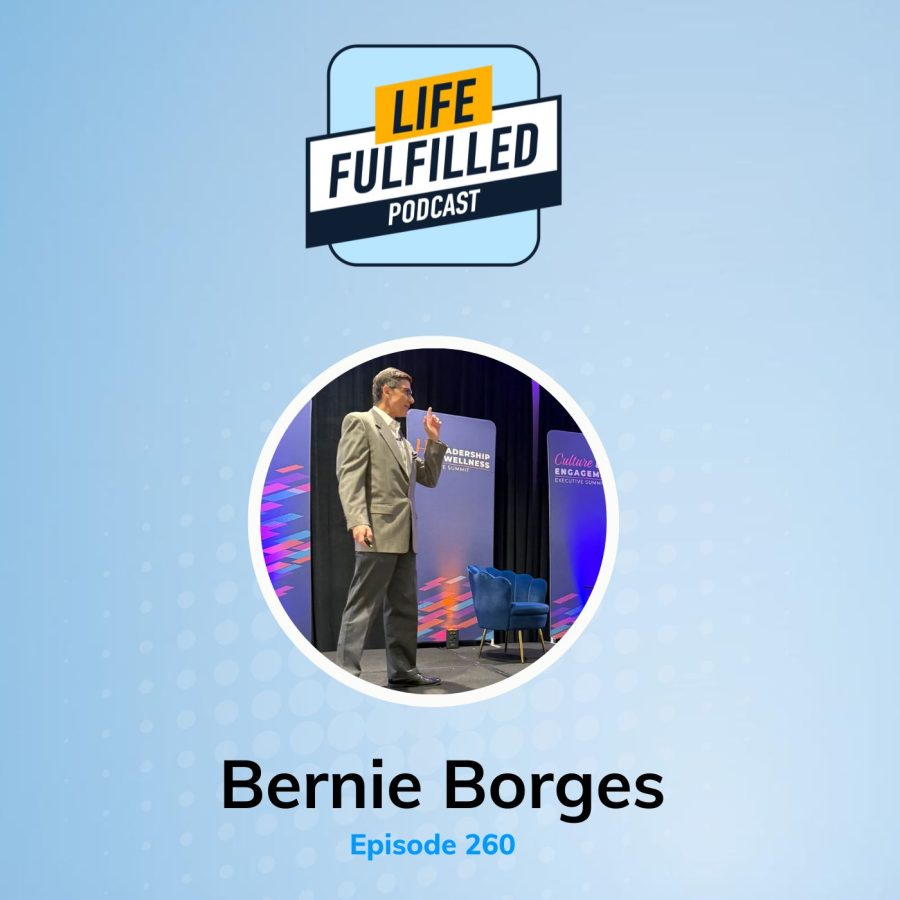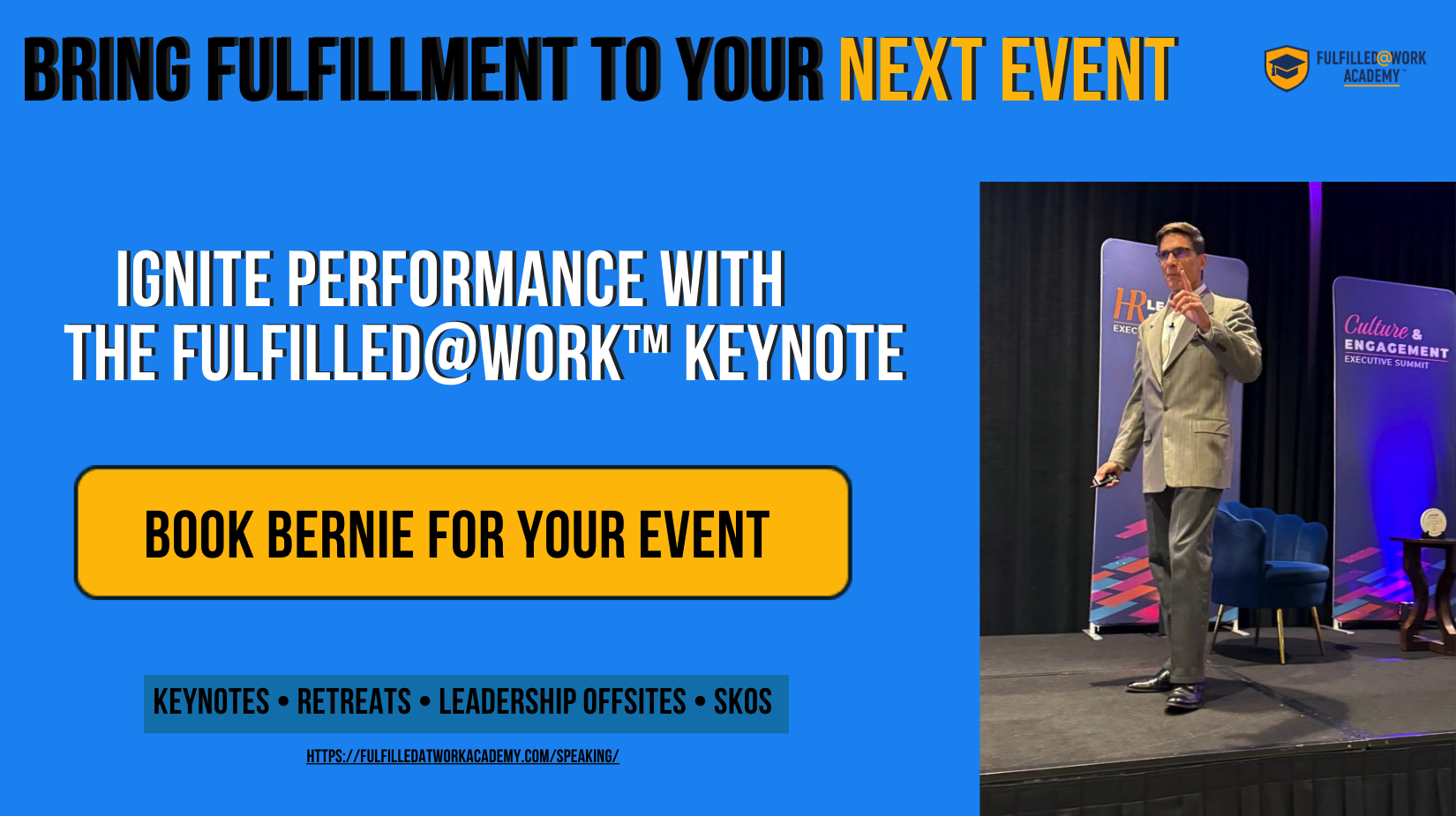Bernie Borges [00:00:00]:
You. Hey, what if I told you that the most effective solution to a problem is the lowest cost solution? In this case, the problem that I’m referring to is employee disengagement. And the lowest cost solution is recognition. Hey, I’m Bernie Borges, host of the Life Fulfill podcast. And in this episode, another solo episode. And I’m having a good time with these solo episodes, by the way. And I do have some guest interviews planned soon. But on this solo episode, I want to discuss recognition and fulfillment at work.
Bernie Borges [00:00:43]:
I think it’s the overlooked connection. Now, before I get started, I want to zoom out first when you think about what truly drives fulfillment in the workplace. Really, recognition doesn’t make the top of the list, at least not at first glance. We talk about things like purpose and compensation and growth opportunities, but recognition, you know, that often gets dismissed as a nice thing to have. And the truth is, recognition isn’t just about handing out compliments. No, it’s about being seen. You know, there’s a fundamental human need at play here. The need to be acknowledged not just for what we do, but for how we do it.
Bernie Borges [00:01:31]:
When someone notices the care that you put into your work, or the thoughtfulness behind your ideas, or the consistency in how you show up, it speaks directly to your sense of value. That kind of acknowledgment hits deeper than a generic, hey, good job. It says, I see you. And when people feel seen, they give more of themselves. They engage more, they belong more. You know, leaders often underestimate this, but a few intentional words can shift someone’s entire week, even their entire view of their role. Recognition isn’t a soft skill. It’s a foundational human need.
Bernie Borges [00:02:22]:
Now let’s look at recognition versus rewards, and let’s look at the difference between the two. Now, I want to clarify something that often gets conflated, and that is recognition and rewards. They’re not the same. Rewards say that you hit your target. Recognition says, I see your effort, I see your growth, I see your care. Rewards are transactional. Recognition is relational, even, in some cases, emotional. You can motivate someone to perform with rewards, but you create a sense of belonging with recognition.
Bernie Borges [00:03:05]:
When people only feel seen and valued when they meet the metrics, fulfillment becomes conditional and fragile. But when recognition is based on character, attitude, and contribution, fulfillment becomes sustainable. And here’s the kicker. For leaders, you can’t bonus your way to engagement, but you can recognize your way there as long as it’s authentic. Rekognition also retains. If you want a retention strategy that doesn’t cost a dime. Recognition is takes like 30 seconds to notice someone’s contribution and then connect it to a deeper purpose. A quick comment like, hey, the way you handle that customer situation really reflected our values.
Bernie Borges [00:04:03]:
That does more than affirm a task. It builds identity. It tells someone, you belong here, that you matter. Now, on the flip side, when people feel invisible, disengagement sets in. When they feel seen, loyalty takes root. You see, recognition is the secret lever of retention. Quiet, powerful, and incredibly effective. Let’s look at peer to peer power.
Bernie Borges [00:04:36]:
Recognition doesn’t need a title or a corner office. In fact, some of the most meaningful recognition happens laterally. In other words, between peers. When a colleague says, hey, your input really helped that meeting go smoother. That builds connection, it builds culture, it builds trust, and it builds respect. Peer to peer recognition removes the pressure from leaders to be the sole source of appreciation. And when everyone on a team commits to seeing and acknowledging just one teammate a week, the culture begins to shift. And fast.
Bernie Borges [00:05:19]:
Look, this isn’t theory, it’s practice. And it works. Now, let’s not forget self recognition. Here’s a question that we don’t ask ourselves enough. When was the last time you recognized yourself? Yeah, you see, we’re conditioned to move on to the next task, the next goal, the next project, the next box to check. But self recognition is a practice of awareness, not ego. It can sound something like this. You know, I handled that challenge better than I would have six months ago.
Bernie Borges [00:05:57]:
Or I stayed calm today when I really wanted to react. You see, when we pause to see our own progress, we expand our own fulfillment. Noticing our growth builds confidence. It builds meaning and purpose. Try it. End your week with a moment of quiet reflection. Give yourself some credit where credit is deserved. You might be surprised with how good it feels when it comes to recognition.
Bernie Borges [00:06:29]:
We should make it a habit, not a holiday. You see, recognition doesn’t belong in an annual review checklist or limit it to just an award ceremony once a year. It needs to be a habit. A voice memo, a handwritten note, a quick slack message, a sincere shout out in a meeting. Recognition doesn’t need to be elaborate. It just needs to be consistent and authentic. When recognition becomes part of the rhythm of your workplace, like meetings or deadlines, you’ll start to see a shift. People feel connected and they perform better.
Bernie Borges [00:07:11]:
They collaborate more. Because when people are seen, they show up. Fully show up. What about the recognition ripple? Well, the ripple that I’m referring to is that recognition is one of the simplest and most powerful forces of career Fulfillment that we have access to, and it costs nothing. And it changes everything. When you recognize others authentically, you’re saying you matter. When you recognize yourself, you’re saying, I’m growing and I matter. And you know what? Those truths really matter.
Bernie Borges [00:07:57]:
Those truths, they shape teams, they form culture, they strengthen families, they transform workplaces, they build communities. Recognition isn’t just about what happens in the moment. It’s about what it sets in motion. So here’s your prompt. And I’m not referring to an AI prompt. Who are you going to recognize next? And what might that spark in them? Okay, before I come to a close, I want to give you one disclaimer. I said a moment ago that recognition costs nothing. But.
Bernie Borges [00:08:44]:
And here’s my disclaimer. For a team of leaders to learn how to give authentic recognition, training is advised. You can’t just tell leaders to recognize your people more frequently without training them. Sure, some of them will know how to do it intuitively, but let’s face it, depending on your industry, your leaders may have risen through the ranks as an individual contributor role roles like a salesperson, a lawyer, a nurse, a technician, accountant, or whatever. You get the point. A common scenario is people who excelled in a role like a salesperson or a lawyer or a nurse or a technician or account or whatever. And then what happens is that leadership says, hey, she’s a great lawyer. Let’s put her in charge of this team of 20 lawyers.
Bernie Borges [00:09:40]:
Or, hey, let’s make our top salesperson the head of sales. This is very common. In fact, maybe you’ve had a boss who was excellent as an individual contributor in their craft, but they had no training to be an effective leader. Unfortunately, many leaders who were great individual contributors are not great leaders. And in most cases, it’s not their fault. They just weren’t given proper training. So, coming full circle back to my disclaimer, giving authentic recognition requires some training. It might be light, it might be casual, or it might be more structured, like my fulfillment centric leadership framework.
Bernie Borges [00:10:29]:
You see, My framework has 10 components. One of the 10 components is devoted into entirely to the concept of employee recognition. And then two of the other components support it through relationship building and authenticity training. In fact, I want to tell you about a program that I’m working on with a leading supplier of employee awards and recognition products. And that company is Crystal D. I’ve had them on the podcast before now, full transparency. Crystal D has partnered with me. In other words, they’re sponsoring me to introduce a program that we’re calling the Employee engagement fund.
Bernie Borges [00:11:11]:
This is a recognition based program that teaches leaders to recognize people both verbally, authentically, of course, and also through recognition artifacts such as the desktop, plaques, awards, that sort of thing, and also through branded merchandise and experiences. And then when you couple that with recognition, it strengthens employee engagement, which improves retention, which improves performance. Now we have an ROI calculator that walks through different scenarios to help you understand if this is something that makes sense for you. So if you want to check out the ROI calculator, schedule a video call with me to explore it. No pressure, just conversation and some ROI number crunching. Hey, that’s it for episode 260. I’m Bernie Borges and I’m the founder of Fulfilled at Work Academy and host of this Life Fulfilled podcast. I want to remind you fulfillment is not a perk, it’s a performance strategy.
Bernie Borges [00:12:19]:
I’ll see you on the next episode of the Life Fulfilled podcast.





